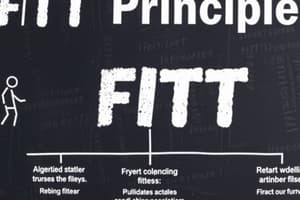Podcast
Questions and Answers
Which option correctly describes what FITT stands for?
Which option correctly describes what FITT stands for?
- Frequency, Intensity, Time, Type (correct)
- Fitness, Intelligence, Time, Training
- Frequency, Interval, Time, Tough
- Fitness, Intensity, Time, Type
What component of FITT would be modified if the goal is to increase the number of workout days per week?
What component of FITT would be modified if the goal is to increase the number of workout days per week?
- Time
- Interval
- Fitness
- Frequency (correct)
What is the primary purpose of the FITT Principle?
What is the primary purpose of the FITT Principle?
- To determine your body type
- To check your fitness level
- To measure your weight
- To help create a balanced workout plan (correct)
What does the acronym PAR-Q represent?
What does the acronym PAR-Q represent?
How many questions does the PAR-Q comprise?
How many questions does the PAR-Q comprise?
Which component of FITT does 'Time' refer to?
Which component of FITT does 'Time' refer to?
In the context of fitness assessment, what does Body Mass Index (BMI) measure?
In the context of fitness assessment, what does Body Mass Index (BMI) measure?
What adjustment did Morley make to his workout based on observations of his peers?
What adjustment did Morley make to his workout based on observations of his peers?
What FITT principle is Morley addressing by changing the duration of his workouts?
What FITT principle is Morley addressing by changing the duration of his workouts?
Which statement best describes how workout intensity impacts cardiovascular endurance?
Which statement best describes how workout intensity impacts cardiovascular endurance?
Which component is specifically used to assess cardiovascular health?
Which component is specifically used to assess cardiovascular health?
What type of condition does the PAR-Q ask about regarding prescribed medication?
What type of condition does the PAR-Q ask about regarding prescribed medication?
Which physical issue does the PAR-Q specifically inquire about?
Which physical issue does the PAR-Q specifically inquire about?
Which condition might affect balance according to the PAR-Q?
Which condition might affect balance according to the PAR-Q?
What question does the PAR-Q ask to determine if someone has a long-term illness?
What question does the PAR-Q ask to determine if someone has a long-term illness?
Which of the following is not a component of a personal health and fitness profile?
Which of the following is not a component of a personal health and fitness profile?
Flashcards are hidden until you start studying
Study Notes
FITT Principle
- FITT stands for Frequency, Intensity, Time, Type; a framework for designing workout plans.
- Adjusting Frequency is essential to increase workout frequency, fostering progress.
- Purpose of the FITT Principle is to create a balanced workout plan tailored to individual needs.
PAR-Q (Physical Activity Readiness Questionnaire)
- PAR-Q stands for Physical Activity Readiness Questionnaire, a self-screening tool for exercise readiness.
- Contains seven questions aimed at identifying potential health risks before physical activity.
- Assesses medical history, including chronic conditions and medications, to guide safe participation in exercise.
Components of Personal Health Profiles
- A comprehensive profile assesses various health indicators, but blood sugar levels might not be needed for all profiles.
- Body Mass Index (BMI) is utilized to categorize individuals as underweight, overweight, or obese based on their weight and height.
Application of FITT in Different Scenarios
- Frequency adjustment example: Jhara plans to increase her workouts from three to five times a week to combat stagnation.
- Intensity focus: Christian selects exercises suiting his fitness level, aligning with the Type component of FITT.
- Time adjustment: Morley reduced his workout duration from two hours to 45 minutes, illustrating a shift in the Time component.
Impact of Workout Intensity on Fitness
- Increasing workout intensity enhances cardiovascular endurance and overall fitness, crucial for effective training regimens.
Health Assessments Using PAR-Q
- Specific inquiries in PAR-Q assess cardiovascular health through blood pressure evaluations.
- Questions target current physical issues such as bone or joint problems, ensuring readiness for physical activities.
Conditions Affecting Balance
- The PAR-Q assesses factors like high blood pressure and dizziness that may influence an individual's balance during exercise.
Importance of Monitoring Health Data
- Tracking personal health data enables better planning and enhancement of workout intensity, contributing to effective fitness outcomes.
Studying That Suits You
Use AI to generate personalized quizzes and flashcards to suit your learning preferences.




